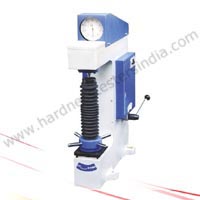

M.M. Engineers is a prominent manufacturer, supplier, and provider of high-quality Rockwell Hardness Testers in Mumbai, Navi Mumbai, and Thane. Our Rockwell Hardness Testers are designed for fast and accurate hardness testing of various materials, offering reliable results for a wide range of applications in industries such as manufacturing, metallurgy, and quality control. These machines utilize the Rockwell scale to assess material hardness with precision, ensuring consistent performance across various testing environments.
As experienced
wholesalers and dealers, M.M. Engineers offers Rockwell Hardness Testers that
meet international standards for quality and accuracy. We also provide a full range of services,
including installation, calibration, and maintenance, ensuring your Rockwell Hardness
Tester operates at peak efficiency. In addition, we supply high-quality spare parts
to help maintain the longevity and reliability of your testing equipment.
For all your Rockwell Hardness Tester needs in Mumbai, Navi Mumbai, and Thane,
M.M. Engineers is your trusted partner for high-quality products, expert services, and
comprehensive after-sales support.
